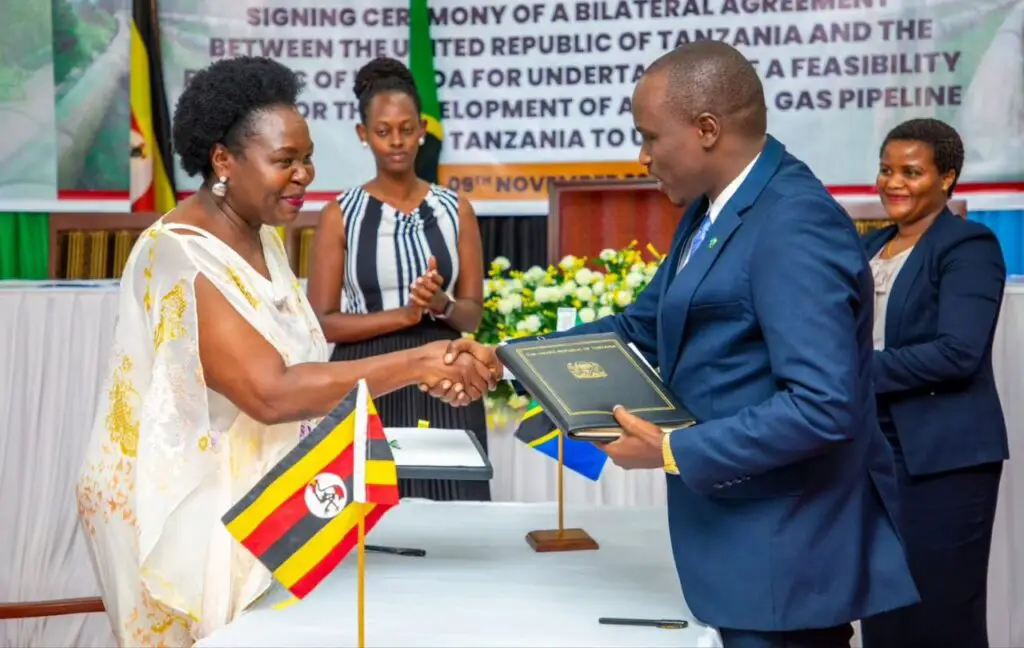- Tanzania will export liquified natural gas through the pipeline to Uganda
- Tanzania will build several plants along the route for domestic use of the gas
- Uganda plans to use the gas for power generation, especially for its iron mining projects
Tanzania and Uganda signed a deal finalising the 2018 MoU on joint natural gas pipeline construction. Tanzania’s Deputy Prime Minister Doto Biteko and his Ugandan counterpart, Minister of Energy and Mineral Development Ruth Nankabiriwahe, signed the deal on November 9
The 1800-kilometre pipeline will run from Tanzania’s southern regions of Lindi and Mtwara to Uganda’s capital, Kampala. This will be the first trans-border gas pipeline in East Africa and is expected to boost economic growth in both countries significantly. The multimillion-dollar project will create jobs along the construction route in both countries.
No official figures have been made public regarding the project’s total value or where the funding will come from. Also, the companies undertaking construction work and other related tenders have yet to be announced.
Last year, Tanzania signed a framework agreement with two international players, Norway’s Equinor and Britain’s Shell, to construct a $30 billion project to export liquefied natural gas (LNG). That deal is expected to be finalised by 2025, and operations will start by 2030 at a liquefied natural gas plant in Tanzania’s southern coastal town of Lindi.
The natural gas pipeline is crucial for Tanzania and Uganda
The pipeline will distribute gas to at least 15 regions within Tanzania along the route to Uganda. Tanzania is already confirmed to have more than 57.54 trillion cubic feet of natural gas reserves.
Tanzania uses natural gas within its borders for power generation, especially industrial use. Natural gas plants are estimated to be up to half of Tanzania’s power generation. The country’s energy output is 684.66 MW from natural gas, 125.429 MW from diesel engines, and 561.843 MW from hydropower plants. In Uganda, the imported natural gas will increase the country’s energy output for its iron and steel ore extraction projects.
In 2018, Tanzania and Uganda entered into an MoU for the project at the end of a three-day Joint Permanent Commission Summit in Kampala. That MoU was signed by then-Tanzania’s Foreign Minister, Augustine Mahiga, and Uganda’s Minister for Energy, Irene Muloni.
It is also known that other neighbouring countries like Kenya and Malawi have shown similar interest in importing natural gas from Tanzania. Should these deals go through, we can expect more MoUs to be signed for building other gas pipelines.
Tanzania is also in talks to enter into an equal sharing of natural gas with Mozambique. As of November 7, Tanzania and Mozambique signed a unitisation deal that agreed on equal sharing of natural gas between the two countries.
By definition, unitisation is whereby a resource, in this case, an oil or gas reservoir covering several licence areas, is developed jointly by the holders of each licence.
Mozambique’s Pura and the National Institute of Petroleum (INP) told local media, “Unlike traditional border disputes in which the demarcation is located within the territory, in this case the gas deposits extend over an area that transcends the two national borders.”
Also Read The orange economy: a feasible development option for African economies.
Shell, ExxonMobile Tanzania: a multi-billion LNG project
Tanzania has been exploring natural gas for more than 50 years. The first natural gas discovery in Tanzania was made in 1974 on Songo Songo Island (Lindi Region), followed by a second discovery at Mnazi Bay (Mtwara Region) in 1982.
The natural gas from Songo Songo was first commercialised in 2004, and the natural gas from Mnazi Bay in 2006. The commercialisation of the two discoveries propelled further onshore and offshore gas exploration.
Four service providers are actively carrying out midstream and downstream natural gas activities. These are the Tanzania Petroleum Development Corporation (TPDC), Songas Limited, Pan African Energy Tanzania Limited (PAET), and Maurel & Prom (M&P). Ophir Energy plc, Shell/BG Group plc (BG), Statoil, ExxonMobil, and Ndovu Resources (Aminex) are other service providers still exploring offshore and onshore.
As of March 2016, the Ministry of Energy and Minerals confirmed that the discovered natural gas reserves amount to 57.25 trillion standard cubic feet (TCF).
There are also ongoing offshore exploration works by several countries, including the United States firm ExxonMobil, which is exploiting a block some 100 kilometres (60 miles) off the coast of Lindi.
Then you have Shell, working with Ophir Energy and Pavilion Energy, which has reported the discovery of 16 trillion cubic feet (453 billion cubic metres) of gas in two other offshore blocks in the same area.
In 2014, Tanzania reported that the offshore exploration project would cost $30 billion to develop. So far, almost ten years later, analysts say cost inflation has added billions more to the investment.
To date, Shell operates Tanzania’s Block 1 and Block 4, which hold 16 trillion cubic feet of estimated recoverable gas.
Similarly, the Norwegian oil and gas producer Equinor (formerly Statoil) operates Block 2, in which ExxonMobil holds a stake. This block is estimated to have more than 20 trillion cubic feet of gas.
The LNG project involves drilling development wells in deep offshore fields and constructing subsea pipelines to transport natural gas onshore for processing. It also consists of making an LNG plant and developing jetty loading facilities in the project area.
Upon its completion, the LNG project will transform the natural gas into a liquid form ready for export to world markets, particularly Asia and Europe.
As mentioned, the LNG project is not solely for export. Natural gas is also used for domestic purposes in power generation, industries, institutions, households, and Compressed Natural Gas (CNG) vehicles.
